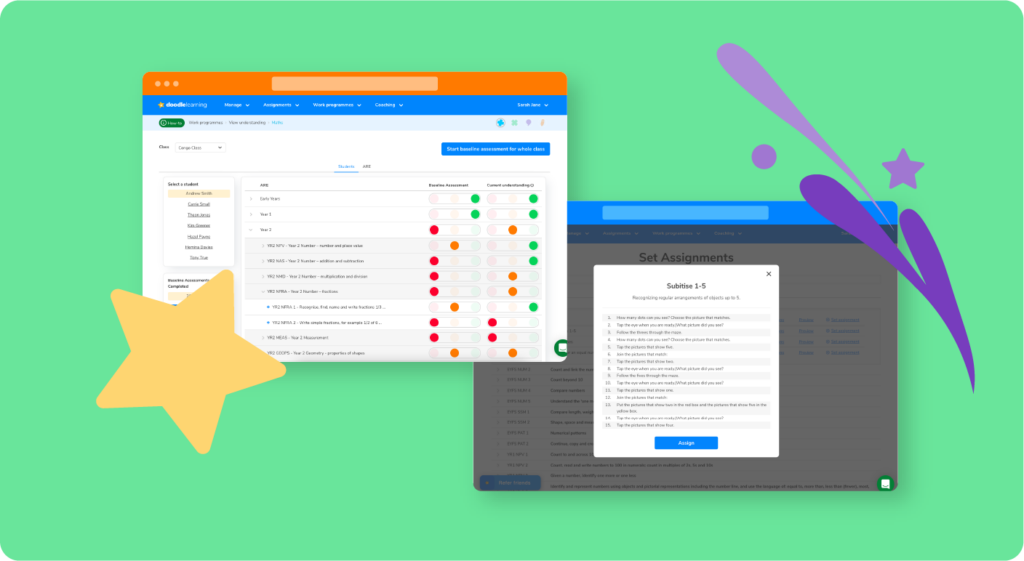

SPaG is a really important concept in the world of language and writing, but what exactly does it mean?

Author
Lucy Hart
Published
March 24, 2023


SPaG is a really important concept in the world of language and writing, but what exactly does it mean?

Author
Lucy Hart
Published
March 24, 2023


SPaG is a really important concept in the world of language and writing, but what exactly does it mean?

Author
Lucy Hart
Published
March 24, 2023


Key takeaways
Table of contents
In this blog, we break down what SPaG is, why it’s important and how you can help your child or pupils improve their SPaG skills!
Unlock unlimited English questions
Put your skills to the test with fun exercises + learning games that are proven to boost ability!
SPaG stands for spelling, grammar and punctuation.
Let’s break down each component in a little more detail:
Spelling is all about accurately representing words by using their correct letter sequence. It’s a really important skill to master, as misspelt words can lead to confusion and misunderstandings.
Grammar refers to the set of rules that govern the structure of language. It includes aspects such as sentence structure, verb tense and words. Good grammar is essential for clear communication as it can make a big difference in how a message is perceived.
Finally, punctuation refers to marks such as commas, full stops and question marks, which are used to clarify the meaning of a sentence. Using punctuation correctly can make a sentence much easier to read and understand, while incorrect or missing punctuation can lead to confusion and ambiguity.
Of course, there are more elements to the English language than these, but mastering these components is a great way to help learners develop a solid foundation of understanding in literacy and language.
Using spelling, grammar, and punctuation effectively is really important when it comes to written and verbal communication.
For example, SPaG can impact the way a message is understood by others. To see this in action, take a look at the following sentence: “Let’s eat grandma!”. It has a completely different meaning to “Let’s eat, grandma!”, all from a single comma being added!
SPaG also plays a key role in KS1 and KS2 SATs, with spelling, punctuation and grammar all being assessed in the exams. This is because of just how important it is for kids to master these skills: SPaG isn’t just handy for school, but also in life more generally!
Whether your child is just getting started with SPaG or is developing their understanding of each area, DoodleEnglish and DoodleSpell are here to help!
Filled with thousands of fun, interactive exercises covering the fundamentals of language and literacy, our Doodle apps create every child a unique work programme specifically tailored to their needs.
Designed by our team of teachers, they cover all core KS1 and KS2 content, ensuring continual progression through the curriculum. And unlike other apps, they explore the meaning behind words and their use in everyday contexts, boosting your child’s vocabulary skills in the classroom and beyond!

Mastering spelling, punctuation and grammar may sound scary, but luckily there’s no need for hours of studying! Instead, practising these areas ‘little and often’ is a great way to boost your child’s knowledge.
Here are some handy tips that you can easily incorporate into your daily routine:
SPaG plays a key role in effective communication. Practising SPaG a little every day will help to improve your child or pupils’ skills in spelling, grammar and punctuation, boosting their effectiveness as a writer and communicator!
If you’re looking for ways to practice SPaG, DoodleEnglish and DoodleSpell have you covered. From fun comprehension exercises to interactive topic explanations, they have everything your kids need to truly master spelling, punctuation and grammar – and best of all, you can try them for absolutely free!
DoodleEnglish is an app that’s filled with thousands of fun, interactive exercises covering grammar, punctuation, spelling and more!
Designed by teachers, it creates each child a unique work programme tailored to their needs, boosting their confidence and skills in English. Try it for free today!

Book a chat with our team
If you’d like to use Doodle’s browser version, please visit this page on a desktop.
To log in to Doodle on this device, you can do so through our apps. You can find out how to download them here: